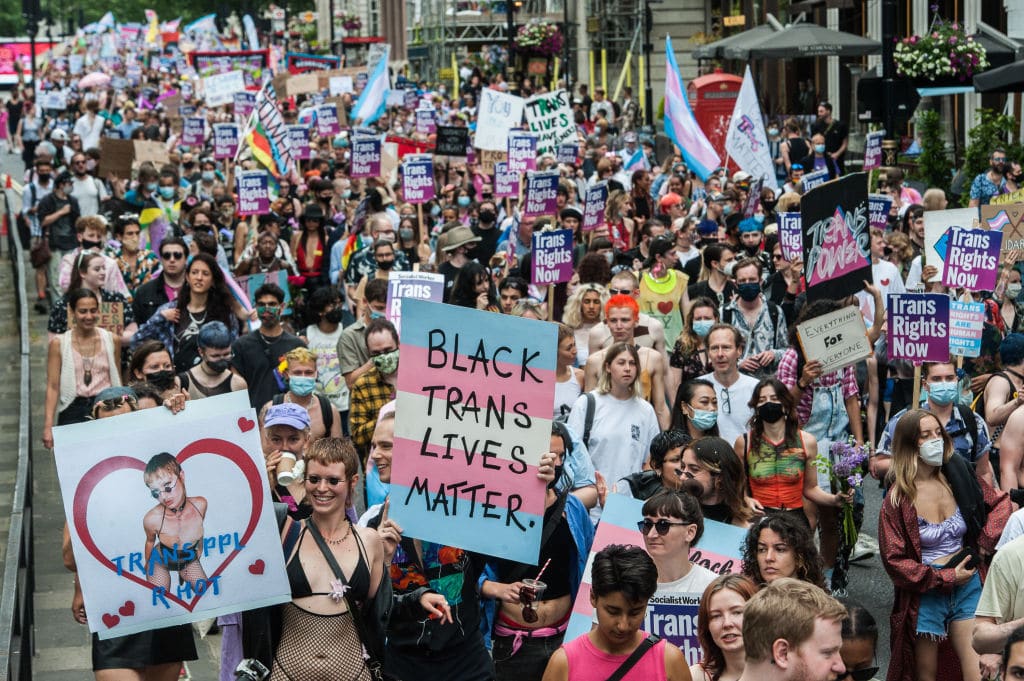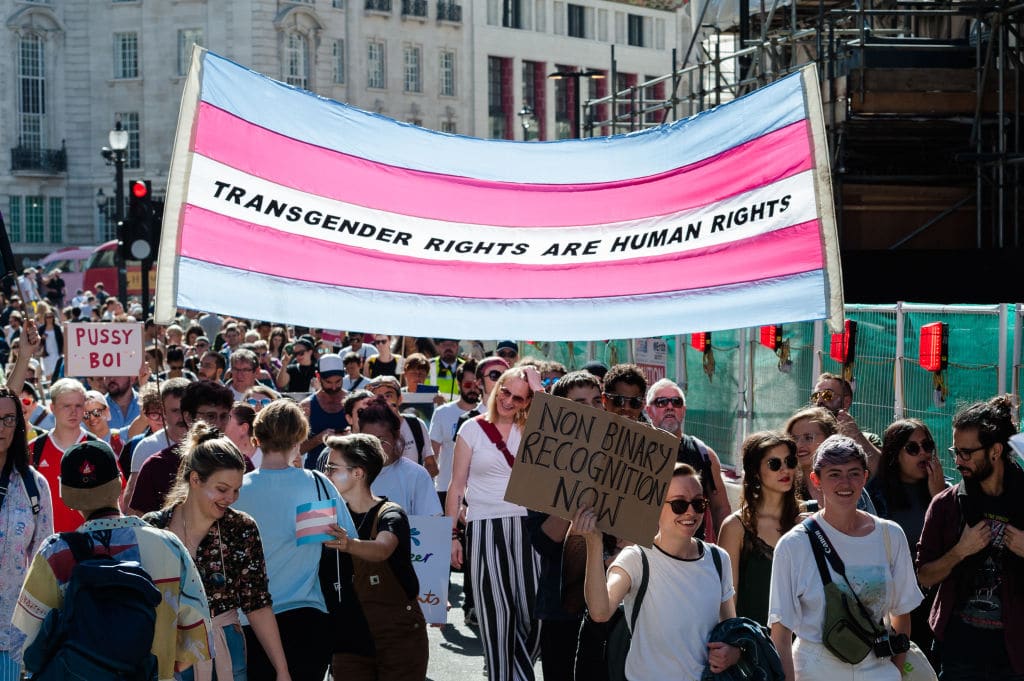People marching in Trans Pride London in 2019. (WIktor Szymanowicz/NurPhoto via Getty)
A leading European LGBT+ rights organisation has warned that anti-trans rhetoric is causing “serious damage” in the UK, citing the BBC’s “transphobic reporting”.
Anti-trans rhetoric and violence has become increasingly common in the UK in recent years, with the nation embroiled in a toxic “debate” about the rights and existence of trans people.
In its wide-ranging annual review, released Tuesday (15 February), ILGA-Europe said anti-trans rhetoric in the UK showed no sign of dying down in 2021, with “mainstream newspapers” running “one or more anti-trans articles every day”. The report also notes that LGBT+ employees have quit their jobs at the BBC over its “transphobic reporting” over the last year.
“Anti-trans rhetoric continued to cause serious damage in the UK again this year,” the review read, echoing its warning from last year.
The BBC has faced intense criticism over its coverage of trans lives, especially in the wake of an article which claimed cis women were being “pressured into sex” by trans women. It was widely derided as transphobic, a claim the BBC denies, and as shoddy journalism.
ILGA-Europe’s report also draws attention to the UK’s mistreatment of asylum seekers, the rise in anti-LGBT+ hate crime, and cuts to anti-LGBT+ bullying programmes.
The UK’s lack of progress on LGBT+ rights and equality in 2021 was largely mirrored across the board, according to ILGA-Europe’s annual report. The organisation found that there was a rise in anti-LGBT+ rhetoric from politicians and other leaders in Europe and Central Asia in 2021.
That rhetoric has fuelled “a wave of violence” against LGBT+ people across the region – however, researchers found that there is an “allied determination” in Europe to tackle anti-LGBT+ hatred.

Sadly, certain groups are becoming more vulnerable – trans youth are bearing the brunt of hate, while the “false narrative” that pitches trans rights against women’s rights continued to gain traction in Serbia, Spain and the UK.
Against that backdrop, there was a stagnation in legal gender recognition in numerous European countries, while there was regression in Greece, Poland, Portugal and Russia.
Anti-LGBT+ violence was rife across Europe in 2021
All of those regressions contribute to the violence LGBT+ people are experiencing across Europe. ILGA-Europe’s report found that violence against queer people was “rife” in 2021, with a 39 per cent rise in anti-LGBT+ hate crime reported in Germany.
Meanwhile, in France, a new app that allows people to report anti-LGBT+ hate crimes recorded 3,896 incidents in its first year, while anti-LGBT+ murders were reported in Azerbaijan, Belgium, Cyprus, France, Georgia, Russia, Spain and Turkey.
One of the lowest points of 2021 came in June when Hungary introduced legislation to ban the “portrayal and the promotion of gender identity different from sex at birth, the change of sex and homosexuality” for minors.
However, ILGA-Europe noted that that backsliding on LGBT+ rights was not matched by public opinion – polls show that people in Hungary are broadly supportive of queer people’s rights.
As LGBT+ rights continued to be eroded in Poland, the European Parliament declared itself an LGBTIQ Freedom Zone in March, and in July, the European Commission opened infringement procedures against Hungary and Poland over its anti-LGBT+ policies.
The situation is particularly grim in Central Asia, where ILGA-Europe recorded regression on LGBT+ rights in all five countries in the region.
Anti-LGBT+ rhetoric has ‘a very real negative impact’ on queer lives
“The spread of anti-LGBTI and trans exclusionary rhetoric outlined in this report has a very real negative impact on people’s lives,” Evelyne Paradis, executive director of ILGA-Europe said in a statement.
“In country after country, we see how it negatively impacts people’s mental health and their sense of safety, their access to employment and the overall ability to progress much needed legal protection.
“At this moment in time, it is essential we remind politicians, media, academics – and sadly even some civil society actors – that real people’s lives are at stake in every country across the region, because of the political scapegoating of LGBTI people.”
Katrin Hugendubel, advocacy director at ILGA-Europe, said: “This report narrates an unparalleled year in Europe, with regional and national institution and courts taking their obligations to the human rights of LGBTI people with utmost gravity amid the now crystal clear escalation of the instrumentalisation of hatred against LGBTI people for political gain and expanded power.
“The advance of using hatred of any minority as an instrument of political gain, which we have seen throughout history, must be addressed and halted with allied determination across the region.”
